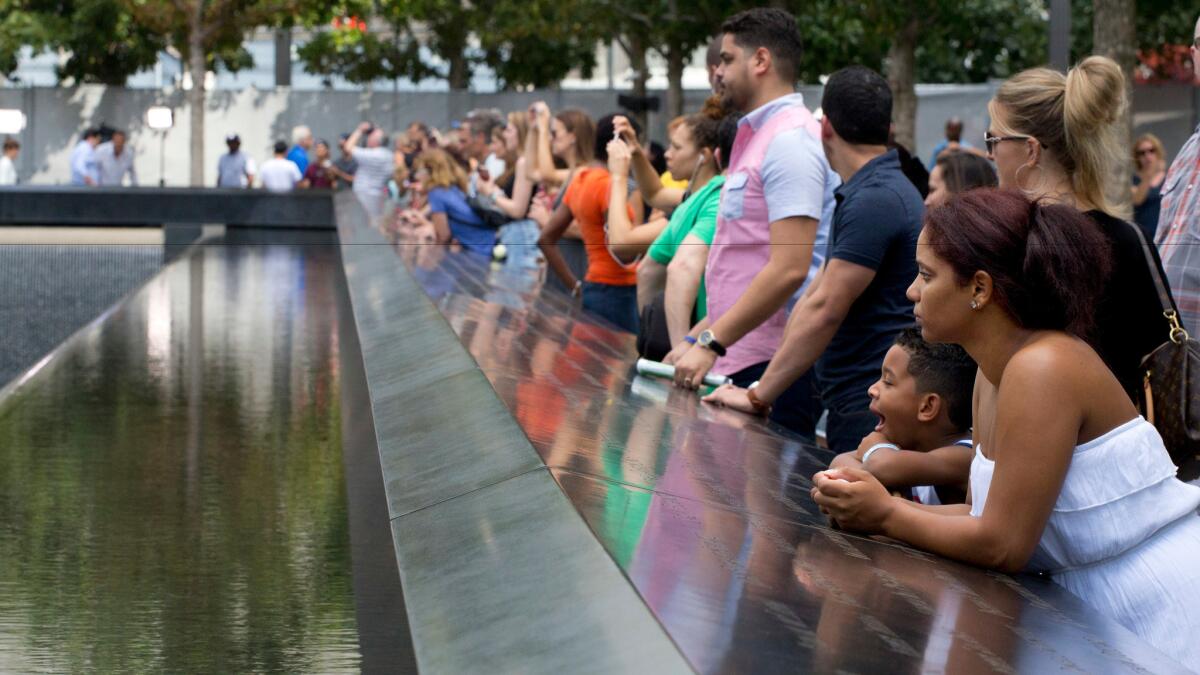Column: Fifteen years after Sept. 11, Americans are afraid but don’t want it to cloud their judgment

Fifteen years ago, in the first fearful days after Sept. 11, 2001, the verdict was almost universal: “This changes everything.”
Only it didn’t. The American way of life hardly changed at all.
The U.S. economy recovered within months of the attack. (The crash of 2008 was caused by bankers, not terrorists.) We got used to taking off our shoes at airports and being screened at ballparks. The biggest impact came from our wars against terrorism: thousands of dead and wounded. But our biggest fear — that terrorists would use chemical, biological or nuclear weapons and pose an “existential threat” to the U.S. — didn’t come true.
Terrorism hasn’t destroyed our economy, our government or our social fabric... And there is no sign that it will in the future.
Within the United States, the total number of people killed by Islamic terrorists since 2001 comes to 94, an average of six a year. Statistically, you’re in greater danger of being killed by lightning (about 46 deaths a year) or drowning in a bathtub (about 300). Terrorism hasn’t destroyed our economy, our government or our social fabric, which is what “existential threat” means. And there is no sign that it will in the future.
And yet Americans are still afraid. The worry that mass terrorism will reach our shores shot up after the attacks in 2001, and it’s never come down. In one poll this year, 51% of Americans said they worry that terrorism could harm someone in their family. “I thought there would be an erosion, but there wasn’t,” said John Mueller of Ohio State University, a longtime scholar of public opinion.
The terrorism we face now is on a much smaller scale than Sept. 11. It comes from homegrown extremists — sporadic, individual attacks like the ones that killed 49 in Orlando in June, and 14 in San Bernardino last year. They are terrible and terrifying, but compared to what we feared 15 years ago, they are few and far between.
Still, they are more than enough to keep the issue front and center in a high-decibel presidential election. Donald Trump has made Islamic terrorism a central theme of his campaign. This is “a moment of crisis,” Trump said at the Republican convention in July. “The attacks on our police and the terrorism in our cities threaten our very way of life.”
Trump has suggested that terrorist incidents will help him win. “It’s probably why I’m number one in the polls,” he said after the Islamic State attack in Brussels in March.
But that was during the primaries. The threat of terrorism doesn’t seem to be driving many votes in the general election. We have had a real-time test of of this with the Orlando attack in June. Trump reacted with a memorable tweet: “Appreciate the congrats for being right on radical Islamic terrorism.” But his support didn’t grow in the weeks that followed. Indeed, in the average of polls compiled by the Real Clear Politics website, Hillary Clinton actually inched up by about 1% right after the attack, perhaps because some voters found Trump’s response unseemly.
Like so many other things, fear of terrorism turns out to be partisan. A poll by the Public Religion Research Institute found that 62% of Republicans say they worry that their families could be harmed by terrorists, compared with only 44% of Democrats.
“If there’s another attack, it might induce some waffling Republicans to vote for Trump, but it probably won’t win him many Democrats,” Mueller said.
So while most Americans worry about terrorism, that doesn’t mean they’re panicked by it. We’re learning to think about homegrown terrorism as a serious, long term problem, but not the existential threat we thought we faced when the Sept. 11 attacks “changed everything” 15 years ago.
Indeed, at a conference sponsored by the Atlantic last week, that was the message from two secretaries of Homeland Security, one a Republican, the other a Democrat.
“I want Americans to dial down some of the hyperbole,” said Tom Ridge, who served under under President George W. Bush. “[Terrorism] will probably happen again here. … Accept the reality.”
“You can’t eliminate all risks,” agreed Jeh Johnson, the current secretary.
On Friday, Johnson noted, the federal government opened its first office in the rebuilt World Trade Center in New York.
“We are a remarkably resilient country in ways that we don’t always appreciate,” he said.
Twitter: @DoyleMcManus
Follow the Opinion section on Twitter @latimesopinion and Facebook
More to Read
A cure for the common opinion
Get thought-provoking perspectives with our weekly newsletter.
You may occasionally receive promotional content from the Los Angeles Times.











